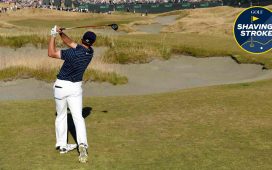Bryson DeChambeau admires the late, great Ben Hogan, so he must know that the 1951 U.S. Open was played on the South Course at Oakland Hills Country Club, known as “The Monster.” In ’51, Hogan posted a 3-under-par 67 on Sunday — a remarkable score under the circumstances.
It was the lowest round of the week. It was one of only two sub-par rounds in the championship. With it, Hogan claimed his third U.S. Open title and the fifth of what would be nine major championships.
Hogan was 5 feet 8½ and 145 pounds, and in 1951 was still recovering from a near-fatal car accident. As Hogan accepted the trophy, he famously quipped, “I’m glad I brought this course — this monster — to its knees.”
The West Course at Winged Foot Golf Club, another grand elder of the USGA, may be even more fearsome than The Monster. Dig: In 2006 at Winged Foot, Geoff Ogilvy won the U.S. Open with a 5-over 285 and was hailed as a bastion of mental toughness. (That was the year Phil Mickelson sliced his last drive off a hospitality tent.)
The game of golf is ever-changing. Hogan wouldn’t recognize today’s equipment— and he founded a club-making company that bore his name and made precision instruments. Golf balls are now wound with artificial intelligence.
Thanks to Tiger Woods, there is a generation of golfers who can rightfully be called athletes. Dustin Johnson can dunk in your face. Forty years ago, if Fuzzy Zoeller had access to one of the PGA Tour’s fitness trailers, he’d step in, ask for an ashtray and order a martini.
Zoeller came closer than Bobby Jones, Billy Casper, Hale Irwin and Ogilvy to bringing Winged Foot to its knees. Zoeller was an old-timey “feel” player, and when he was feeling it, look out. In the 1984 U.S. Open at Winged Foot, Zoeller shaped his way to a 4-under 276 and beat Greg Norman — one of the longest hitters of his era — in a playoff.
DeChambeau beat Zoeller’s Open record at Winged Foot using a combination of advanced science and well-hewn muscle mass. He shot 6 under on a West Course that was made more punishing than the track Zoeller saw in 1984, or that Ogilvy saw in 2006. One of the hardest courses in the world was given a higher degree of difficulty.
And DeChambeau truly brought Winged Foot to its knees. He closed with a 3-under 67 — just like Hogan at Oakland Hills in ’51. DeChambeau’s round will be considered one of the great closing rounds in Open history. It capped a tournament in which he was the only player under par and won by six strokes.
DeChambeau began to take off after he won the 2018 Memorial. To that point, his normal route to the U.S. Open was to qualify at one of the Columbus-area sectionals. He won three more tournaments in 2018 and when he showed up at the Memorial last year, I wrote about him:
“One of these days, the ‘Mad Scientist’ might just outthink a major tournament — which makes him a threat. Plus, the dude is paint-dry slow. If he played in the 1970s, Lee Trevino would be flicking smoldering lung darts at him.”
DeChambeau is slow because he brings a scientific method to his shot-making; he considers everything from air density to trajectory to “run out” before he even addresses the ball. He has been known to use a compass to read a green. One can only wonder what science he uses to put on 40 pounds of muscle in six months.
At Winged Foot, DeChambeau proved the ultimate merit of his calculations — and his bulked-up, brute strength. There is much to admire in an iconoclast who is true to himself in the face of criticism. Most notably, DeChambeau proved he is capable of executing his shots and making his putts (on some wicked, undulating greens) under the most extraordinary pressure. Viva yo.
Yet, I don’t like it that Winged Foot can be strangled by a bodybuilder who needs 15 minutes to read his instruments before he rips a ball out of rough that is so thick Hogan would have taken a drop.
If that’s the way the game is going, it’s time to restrict the flight of golf balls for pros, at least at the majors. And if that seems too radical, then it’s time to allow fans to yell from the rope line and get players to engage in some colorful trash-talking.
At the very least, tournament directors ought to make players keep up with the group in front of them. Even Winged Foot has a four-hour rule. That’s golf.
Michael Arace is a columnist for the Columbus Dispatch, part of the USA Today Network.








